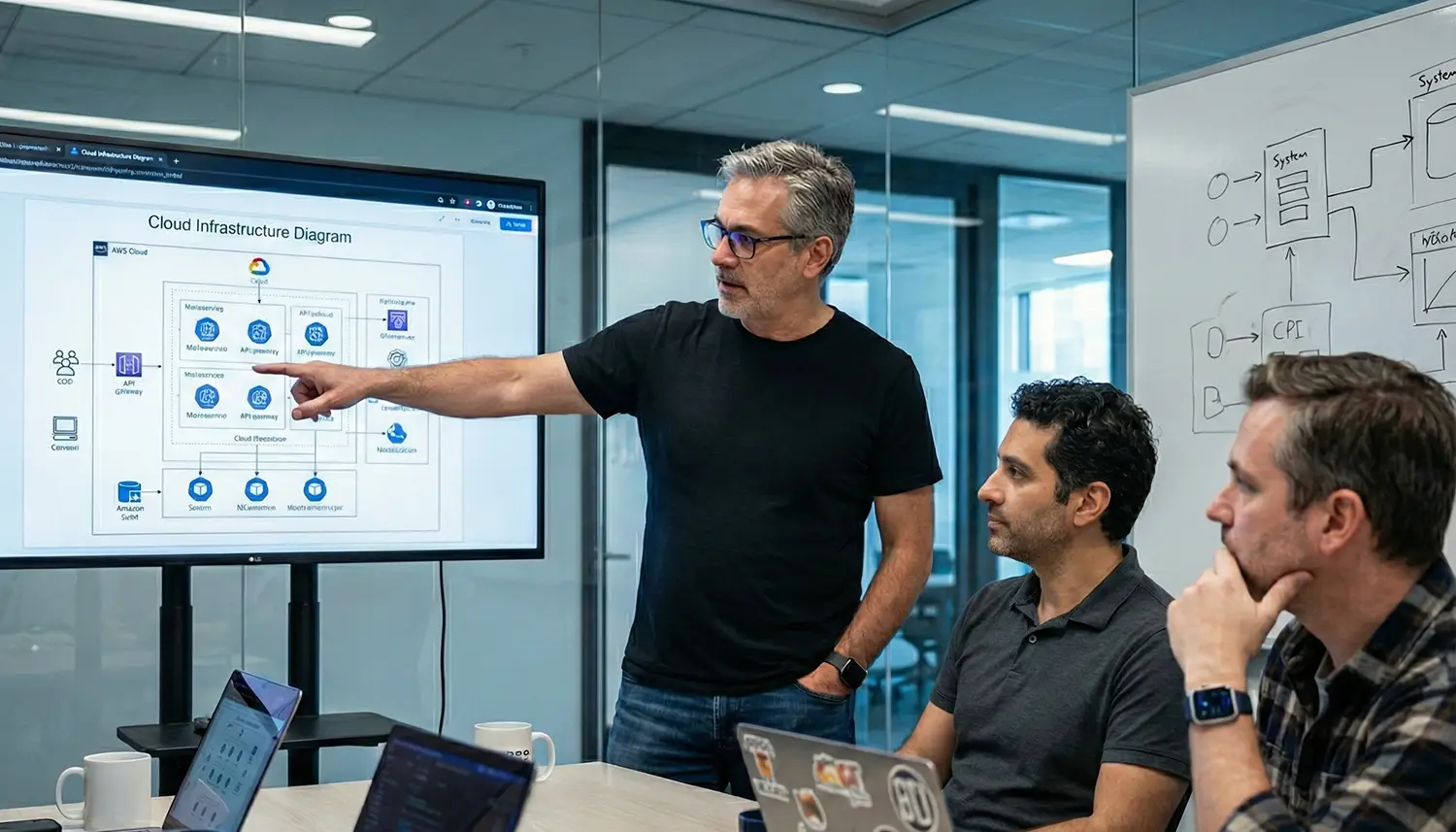By Jocelyn Sexton — VP of Marketing at Growth Acceleration Partners
A year or so ago, it was totally appropriate to ask a CTO, “Is AI factoring into your technology roadmap?” But ask an innovation leader that question today, and you’ll see uninformed or even insulting. Oh how quickly things change!
AI is now an assumed priority, and an embedded expectation. From AI integration to new solutions in your product roadmap, AI has almost become table stakes. Tech leaders are leading with it, measuring it and for sure, being held accountable for it. And as such, many companies are shifting from exploration to execution. In fact, a pulse survey by PwC showed that 47% of CIOs have integrated AI into their tech, processes, and workflows.
However, you really can’t think about AI strategy without thinking about software and data engineering. Plus also… do you have in-house expertise? And if not, who is going to do that work for your company?
Making AI Work Takes More Than AI
Custom software and robust data engineering are what turn AI strategy into actual business value. As AI becomes operationalized, custom software is how companies will embed intelligence into their actual workflows, products and platforms. For example: you might have a central dashboard that shows results of your AI analysis, add a chat interface to your existing application, or create a mobile app to allow access to your AI on the go.This is important because custom software allows AI tools to be tuned to your company’s unique business logic, systems and user needs.
Likewise, data engineering is the backbone of AI readiness. You need to ensure data pipelines can support real-time and AI-native workloads. You also need to connect to the disparate sources of data in your enterprise to power the AI breakthroughs you seek. Models require clean, well-structured and governed data to train, fine-tune and monitor AI effectively. And that’s where data engineering comes in.
Without access to the right data, AI projects are bound to fail. A recent study by IDC and NetApp discovered that up to 20% of AI projects fail due to inadequate data infrastructure.
Data engineering teams build the pipelines that ingest, transform and deliver the data. Beyond infrastructure, data quality monitoring has become essential for both trustworthy AI governance and consistent model performance.
Finally, as great as AI is, you still need people. Specifically, you need AI-literate software, data and DevOps teams. But your internal teams often lack either the headcount or the specialized skill sets needed to move fast. That’s where smart, strategic staff augmentation comes in to make it all work.
So if you’re a CTO, CIO, VP of Engineering or high-level, decision-making innovation leader… let’s talk about that. What’s your best solution for solving your company’s most critical software, data engineering and staffing challenges to actually make AI work?
Software-driven innovation is a business imperative, and data underpins every strategic decision. CTOs face enormous pressure to deliver scalable, secure and intelligent digital ecosystems, but often without the internal bandwidth or specialized expertise to do so. That’s where Growth Acceleration Partners (GAP) steps in.
GAP is not your traditional nearshore outsourcing or staff augmentation firm. GAP is a consulting and technology services company that partners with growth-minded and enterprise businesses to design, build, and modernize mission-critical software and data systems. With a hybrid delivery model rooted in deep technical expertise and business-first thinking, GAP offers a unique value proposition for leaders seeking long-term velocity, resilience and ROI from their technology investments.
Engineering for What’s Next: GAP’s Value to Technical Leadership
GAP delivers end-to-end services across software and data engineering — everything from early advisory and architecture to implementation, optimization and managed services. What sets GAP apart for technical leaders is its ability to integrate deeply into your business while maintaining technical autonomy and execution excellence.
Here’s why CTOs turn to GAP:
-
Strategic Engineering Partnership Over Staff Augmentation
Hopefully, you’re looking for more than just “temp staff.” To make an impact, you need the right combination of people, processes and thought leadership. Rather than providing isolated resources, GAP delivers high-performing, fully integrated engineering teams. These teams are built to serve as long-term extensions of your internal departments, not transient consultants. GAP’s unique 2NABOX delivery model pairs a U.S.-based Client Executive with a LatAm-based Delivery Manager to ensure leadership alignment, high-quality execution and cultural synergy.
These teams are tailored for complex development initiatives, including:
- Full-cycle custom application development
- Cloud-native and hybrid software platforms
- End-to-end data pipelines and lakes
- Modernization of legacy systems
- Embedded AI and machine learning applications
As AI becomes core to modern digital products, GAP’s embedded teams are increasingly called upon to architect and implement intelligent features — from LLM-powered user experiences to model-integrated backend services — that drive measurable business value.
Their approach allows companies to scale smarter, without the friction of hiring, onboarding or constantly re-educating rotating consultants.
-
Depth in Software Engineering Across the Stack
GAP brings an enterprise-grade playbook to every engagement. Their software engineers specialize in everything from front-end frameworks like React, Angular, and Vue, to robust back-end environments powered by .NET, Java, Node.js and Python. GAP’s engineers also implement API-first, microservices architectures designed for long-term maintainability and platform extensibility.
Whether integrating with foundational models like GPT or building custom AI modules, GAP’s engineers bring the technical fluency needed to create resilient, AI-enhanced software that performs at scale.
Key software services include:
- UI/UX design and front-end development
- Legacy modernization and migration to cloud-native infrastructure
- Mobile app development (iOS, Android, Flutter, React Native)
- DevSecOps and CI/CD pipeline automation
- QA automation with tools like Cypress, Selenium and Playwright
In today’s AI-first world, frameworks and architectures must be designed with extensibility in mind — enabling rapid iteration, testing and deployment of new intelligent capabilities without re-architecting from scratch.
Their focus on engineering automation — paired with best-in-class QA — ensures high code quality, delivery velocity and operational stability.
-
Data Engineering and AI That Powers Innovation
GAP’s data engineering expertise is a cornerstone of its value to clients undergoing digital transformation. From developing real-time data pipelines to building advanced data lakes, GAP helps businesses unlock value from their data by improving architecture, quality and access.
Data powers every model and every decision. GAP’s approach to data engineering is purpose-built for AI enablement, ensuring the inputs to your models are clean, contextual and continuously optimized.
Key capabilities include:
- Data pipeline design (ETL/ELT, CDC)
- Cloud-native data platforms using Snowflake, Databricks or BigQuery
- Machine learning integration and model deployment
- AI-powered data governance and metadata management
- Business intelligence and dashboarding
From predictive analytics to generative AI use cases, GAP experts ensure your data stack evolves in lockstep with your AI ambitions. Through their engagements with companies like MediQuant and Self Financial, GAP has modernized data onboarding and infrastructure operations — freeing internal engineering teams to focus on innovation rather than maintenance.
-
Modernization and Migration as a Core Competency
GAP is a recognized leader in application modernization, especially for legacy platforms that hinder agility and performance. The acquisition of GAPVelocity.ai modernization business further strengthened GAP’s ability to convert aging systems into scalable, cloud-native architectures — using proprietary AI tools to migrate millions of lines of code from VB, PowerBuilder or WinForms into modern frameworks.
Their modernization expertise spans:
- Legacy to .NET/.NET Core migrations
- Cloud readiness and infrastructure transformation
- Containerization and serverless architectures
- Automated code conversion using AI pattern-matching
GAP’s proprietary AI AI Application Modernization tools aren’t just accelerating modernization (although that’s clearly a key focus). They’re also setting the stage for AI-readiness by converting legacy codebases into modular, data-rich platforms capable of supporting intelligent automation and advanced analytics.
Why Companies Choose GAP
We know you have a lot of choices… and staff augmentation firms and software development companies can seem like a dime a dozen. But at GAP, we offer business leaders a transformative capability to future-proof their tech stacks with minimal business disruption. Whether you’re focused on architecture, data, DevOps or even overall engineering culture, GAP designs for AI readiness.
Whether you’re embedding machine learning in your product, scaling intelligent data pipelines or exploring generative AI use cases, GAP helps you bridge the gap between experimentation and execution. These teams don’t just write code — they lay the groundwork for intelligent systems that learn, adapt and deliver business value.
GAP’s appeal to high-growth SaaS companies, PE-backed startups and enterprise clients lies in its Three Uniques:
- Breadth of Capabilities with End-to-End Services
GAP manages the full product lifecycle — from concept to sustained operation — ensuring continuity, accountability and strategic value across every phase of the project. - Depth of Innovation and Modernization Expertise
Their AI-augmented engineering tools and modernization frameworks accelerate timelines while minimizing risk, enabling GAP to tackle complex digital initiatives with precision. - Investment in People to Fuel Client Success
GAP’s engineers — known as GAPsters — stay with the company for years, thanks to a culture of continuous education, diversity and professional growth. This results in high retention, deep business knowledge and better outcomes for clients.
Engineering Teams Designed for Strategic Impact
Whether you’re a CTO overseeing a digital transformation, a startup scaling into a new market, or an enterprise replatforming mission-critical systems, GAP brings the technical acumen, strategic mindset, and execution discipline to meet your most complex challenges.
As one client put it:
“GAP is professional, flexible, reliable and really takes care of their customers. Their GAPsters provide great results.”
— NSPA
With over 1,600 successful projects delivered GAP continues to be the go-to partner for companies that want not just to build software—but to transform their business through it.
Ready to Build the Future of Your Engineering Organization?
Connect with GAP to explore how their software and data engineering services can accelerate your strategic vision and make your technology ambitions a reality.



